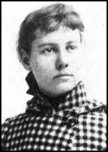
The decades following the Civil War are known today as the “Gilded Age.” It was a period when men smoked cigars wrapped in hundred dollar bills and women favored being voluptuous. You might say it was a period when women became more visible. Women of all classes began experimenting with the pleasures once reserved for men. They showed up at restaurants once reserved for men and attended the theater once the preserve of rowdy young men and hardworking prostitutes.
There was one woman who was the most outrageous, splashy, and outspoken. Her name was Nellie Bly and in the 1880s she was a reporter for the New York World.
Nellie would regularly get herself on the front page of the New York World by what was then considered a version of investigating reporting. Once she got herself committed to an insane asylum to expose conditions there. Another time she went to jail and reported on how the prisoners were being treated. She even pretended to be a nurse and was hired by the City Hospital. It didn’t take long for Nellie to find out how unsanitary the hospitals were. The editor of her newspaper received many complaints from the city’s officials, but her stories increased sales; so he encouraged her to continue.
Then in 1889 she announced that she intended to become the first person to actually go around the world in 80 days. (Jules Verne had written a novel in which the male hero did just that.) Bly set off, carrying only a small bag crammed with underwear and a large jar of cold cream. She sailed to England, raced through Europe, jumped off to Yemen, ricocheted through Hong Kong, and returned to San Francisco. A cross-country train brought Nellie back to New York in 72 days, 6 hours, 11 minutes, and 14 seconds. She was a celebrity and, as the newspapers decreed, had the “combination of superb qualities, which all sound-hearted men and women admired.”
It was improper in the late 19th century for women journalists to use their real names. Nellie Bly was the pen name for Elizabeth Cochrane. Elizabeth was born on May 5, 1867. As she grew up, she discovered that only low-paid occupations were available to women. In 1885 she read an article in the Pittsburgh Dispatch entitled “What Girls Are Good For.” The male writer argued that women were only good for housework and taking care of children. Miss Cochrane was furious and wrote a letter of protest to the editor. As a result of her letter, Elizabeth was commissioned to write an article on the lives of women. She was only 18 at the time. Thus was the beginning of Nellie Bly’s journalistic career, which incidentally ended in 1895 when she married a millionaire.
When World War I began, Nellie immediately traveled to the Eastern Front and wrote for the New York Evening Journal. When her husband died, she took over the management of his factory and instituted many improvements to the working conditions there. Nellie (Elizabeth Cochrane Seaman) died of pneumonia on January 27, 1922.
